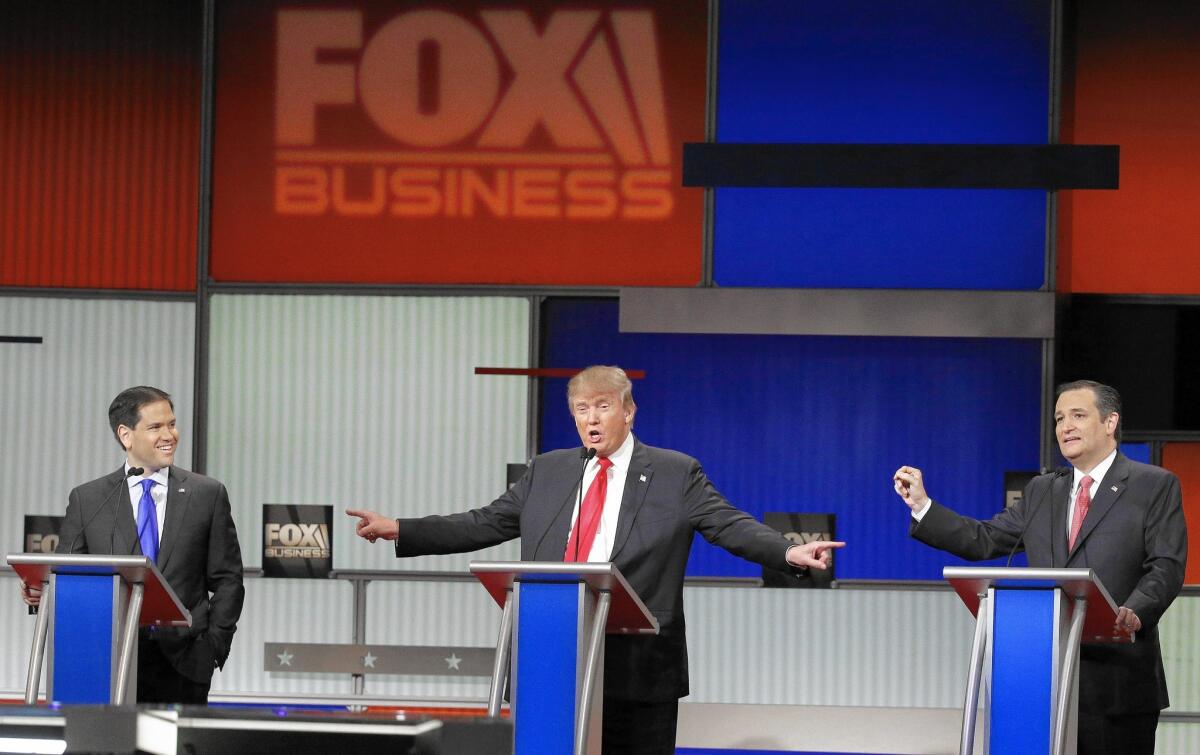Capitol Journal: When Ronald Reagan was called a ‘liar’ it was shocking and disrespectful -- times have changed

- Share via
in SACRAMENTO — The president was speaking. And from the gymnasium nosebleed seats came a perfectly timed shout: “Liar, liar, pants on fire.”
I don’t think it was from Donald Trump. Probably not Sens. Ted Cruz or Marco Rubio either.
It was 32 years ago, and when President Reagan paused between sentences, the outburst penetrated the silence. It was shocking.
But I also remember being a little amused, in a head-shaking way, at the absurd incivility and disrespect.
“The American people don’t like bad manners — rude, disorderly bad manners,” commented Reagan spokesman James Lake.
But that was then — a more mannerly era, before all the cultural coarseness nurtured by the impersonal Web and social media.
Reagan was on a reelection campaign swing through Oregon, speaking at the University of Portland. I was The Times’ White House correspondent.
The “pants on fire” guy, I assumed, was some longhaired, pot-smoking hippie type.
But today, he could be a candidate for the Republican presidential nomination. Trump often acts like the most immature 69-year-old in America.
Cruz or Rubio? They frequently soil — along with their colleagues — the Senate’s historic reputation as “the world’s greatest deliberative body.”
The pair not only have been tossing campaign invectives at each other, they and their GOP cohorts are balking at deliberating over any Supreme Court nominee offered by President Obama.
The Republican candidates called one another liars 22 times in a debate Saturday night.
My favorite L-bomb came Monday, however, when Trump said this about Cruz:
“He’s a lying guy. A really lying guy. Some people misrepresent. This guy is just a plain-out liar. In fact, I felt better because Marco Rubio called him a liar the other night on stage. I felt so much better. I said, ‘Good, a politician called a politician. Now I can call him a liar.’”
Guess that’s what some Trump fans call “telling it like it is.” I call it classless and scary.
Most Republican candidates like to equate themselves to Reagan. Well, maybe not Trump. He’s his own icon.
Reagan would never call an opponent a liar, at least not without smiling.
The only time I ever heard the word from his lips was in a gentle jab at President Carter in 1980: “Anyone who says he likes cold showers will lie about other things too.”
In 1988, Sen. Bob Dole stunned TV viewers after losing the New Hampshire Republican presidential primary to then-Vice President George H.W. Bush. Asked whether he had a message for Bush, Dole responded: “Yeah, stop lying about my record.”
Fast forward to 2009.
As Obama delivered a healthcare speech to Congress, Republican Rep. Joe Wilson shouted: “You lie.” The South Carolinian later apologized for his “lack of civility.”
Are just Republican politicians addicted to the word? Democrats must call their adversaries liars. But offhand, I don’t know of any case. Hillary Clinton and Sen. Bernie Sanders are waging a relatively polite scuffle.
Can someone as uncouth as Trump — and maybe one or two rivals chasing him — actually be elected president? It would say plenty about the modern American voter.
“We’re voting with our middle finger,” a Greenville, S.C., used car dealer told a Times reporter this week.
“I hope he drops an F-bomb,” a Trump fan commented on the way into a campaign rally.
Electability came to mind after Supreme Court Justice Antonin Scalia died over the weekend. Americans not only will be electing a new president in November, they’ll be deciding which ideology controls the court.
Now on the bench are four liberals, three conservatives and one right-leaning swing vote: Anthony Kennedy of Sacramento. That’s the formula for a lot of 4-4 ties. Not only is Scalia’s seat vacant, but three justices are age 77 or more. Two others are at least 65. The next president could shape the court for decades.
Shame on Cruz and Rubio for falsely claiming during the debate, and in the days since, that there was an 80-year precedent of the Senate not confirming a lame-duck president’s Supreme Court nominee during an election year. It wasn’t really a lie — just a crock of ignorance.
Kennedy, a Reagan nominee, was confirmed in 1988, the president’s last year in office. In fact, there are several examples since 1900 of justices being confirmed during a presidential election year.
The Supreme Court’s vital importance to California is demonstrated by one particular case, which seems to have been upended by Scalia’s death.
The court, experts believe, was on the verge of prohibiting the California Teachers Assn., and therefore other unions, from hitting up nonmembers for collective-bargaining fees. This would have weakened the unions’ political power.
But now the court is expected to wind up in a 4-4 tie, leaving the current law in place.
Controversial issues involving abortion, immigration, affirmative action and the composition of legislative districts also are pending before the court.
Voters don’t normally choose candidates in primaries based on their electability in November. People mostly look for candidates they agree with, like and trust. This year, they should think more about who will pick the court.
Too bad Californians won’t be allowed to vote until June. Odds are, the nominations by then already will be sewed up.
Meanwhile, I’ll be waiting for the first candidate to add to his rhetorical repertoire: “Pants on fire.”
Twitter: @LATimesSkelton
More to Read
Get the L.A. Times Politics newsletter
Deeply reported insights into legislation, politics and policy from Sacramento, Washington and beyond. In your inbox three times per week.
You may occasionally receive promotional content from the Los Angeles Times.











